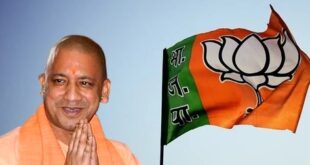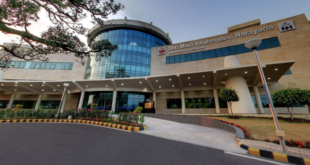
A sticker for discipline, upright, efficient, and one who has always lead from the front, 1981 batch IAS officer Anil Swarup adhered strictly to the Service code of conduct during the 38 years of service. During this period he held various key positions both in the Uttar Pradesh and Union governments. Not afraid to defy corrupt politicians even when he knew they could harm his career, he diligently executed orders and intervened only internally wherever necessary, but he never took these controversial issues to the media. Retirement has given Swarup the freedom to break his silence and he lets his pen do the talking. His two books, Not just a Civil Servant and Ethical dilemma of an IAS officer are now in the public domain, through the pages of these books he walks the reader through his years in the corridors of power.
This interview is the outcome of my telephonic interview with the IAS-author- spread over two hours with two one hour each session. Considering Swarup has been indisposed due to health issues and was resting his ailing body, the officer sounded his usual self -strong and calm, critical of the media’s doing, giving his opinion on greedy politicians, quirky Babus and his great stress on the good of the common man. He appeared totally satisfied with the way he had molded his life and did not allow ethical dilemmas to deviate him from the path of truthfulness and justice.
Q: Was becoming an IAS officer always your first career choice. ?
A: Actually I lived the dream of my father, an engineer he wanted me to be an IAS officer. I recently discovered and greatly treasure the piece of paper wherein he had chalked out my career plans when I was just three then.
I do not remember when and how his dream became mine but today having lived it I can say without being modest that he judged me right,. I was born to be an officer. In fact, I would love to be one again in my next birth too.
Q: You got selected as an IPS and even served for a year before quitting. Why?
In just a year only I realized that police service was not for me. As a cop I would be limiting myself to just criminal interventions whereas as an IAS officer I would be exercising positive impact which would influence the lives of so many. Today as I look back over the years I can say with satisfaction that my decision was right.
Q: How did you cope with decisions which gave rise to ethical dilemmas?
A: Ethical dilemmas did plague me in my initial days of service. But soon I realized that I had to take a stand and I had to become indifferent to the consequences, which were after all not in my control. This way the fear of penalty, punishment went away and I let my conscience compass guide me.
Actually frankly I realized my true worth after retirement, I get so much respect and love from both the serving officers and those who have hung up their boots. It feels good.
Q: Did you have any role model whom you followed?
A: There can never be one role model in anyone’s life. No individual is perfect, every individual has at least one good quality, I have always tried to emulate this one good quality be it from my bosses or the junior-most officers.

Q: Is it ethical to write about things you had never spoken about during service?
A: It is ethical because the TRUTH must be told. It must be told to the IAS aspirants, it must be told to the honest officers who become cynical when confronted with ethical dilemmas while performing their duty. They must be told not to lose heart. They must know that there were other officers before them who tackled these dilemmas and overcame them. The serving officers’ morale must be kept high, they must be told that survival is possible in this profession with your ethical values intact.
Q: In your two stints in Uttar Pradesh you served two prime ministers, Kalyan Singh and Mayawati. You were also an unofficial adviser To Mulayam Singh Yadav. Your take on them?
A: Outstanding politicians all, but all three were poles apart. I worked with Kalyan Singh both times he was chief minister. While in the first term he was excellent in the second term he was a big flop. In the second term he was MISguided by cooperator Kusum Rai, the latter became his sole adviser and that affected his working style.
Q: What was Kalyan Singh’s stand on Babri masjid ?
A: He NEVER wanted the Babri structure to be brought down. He desired a legal settlement, exactly what the Supreme Court has ruled.
Q: Tell us about the poem you had written for him and how he reacted to it.
A: Ek Masiha tum bhi ban jaao. When I read it out to him he cried and said to me that he will try to become like.
Q: What is your opinion about Mayawati, the first A Dalit woman who was CM of UP not once but four times?
A: In my entire life I have never come across a more corrupt and petty person than her. A politician who only values money Mayawati will go to any extent to amass wealth.
I have been witness to so many instances when I saw how nazrana exchanged hands. My most memorable was the case of one of my senior colleagues (he is dead now so I will not name him) who walked into the CM’s room with a briefcase and he returned empty-handed after meeting her..
Q: What about Mulayam ?
A; Smart, intelligent and endearing person. He was always rooted to the ground. Though I never officially worked for him, he often called me for informal meetings to seek my opinion on certain issues.
It is so sad that Amar Singh poisoned his ears and distanced him from all his well-wishers. The results are before everyone to see.
Q: You suggest that conscientious officers should take ‘judicious’, and not ‘‘political’ decisions in order to protect the Constitutional rights of a citizen. But is this possible in a situation where your political bosses hold a different ideology.
A: An officer can voice his opinion during the internal discussions and through his notings on the files, but yes it is true once the political bosses overrule it, he has no choice but to comply with the orders.
Politicians are very shrewd; they have a perspective that is why an officer must know how much he will bend. Criminal justice should never be compromised because in that case, you let down your profession and your people.
Q: How do you expect a bureaucrat to handle insults, public humiliations, by his political bosses.
A: Public humiliation of officers a totally wrong practice, it is against good governance. If an officer has to be punished it should be done in a way that it should not hit his dignity. Public shame should never be resorted to as it will demoralize the entire lot and will impact governance.
Q: It is common to label pro-government journalists Goodi media. But what does one call hand-picked officers, who carry out ideology-driven schemes of their political bosses?
A: Let us first understand the work profile of the two. While the work of the media is to critically evaluate government orders and schemes and apprise the masses about their minus and plus points the work of bureaucracy is to execute the orders of the government as per se. One works outside and the other within the system. Hope I have made myself clear.
Also Read :Weekend Rendezvous: Travel Influencer wants to help boost domestic tourism
 Jubilee Post News & Views
Jubilee Post News & Views




